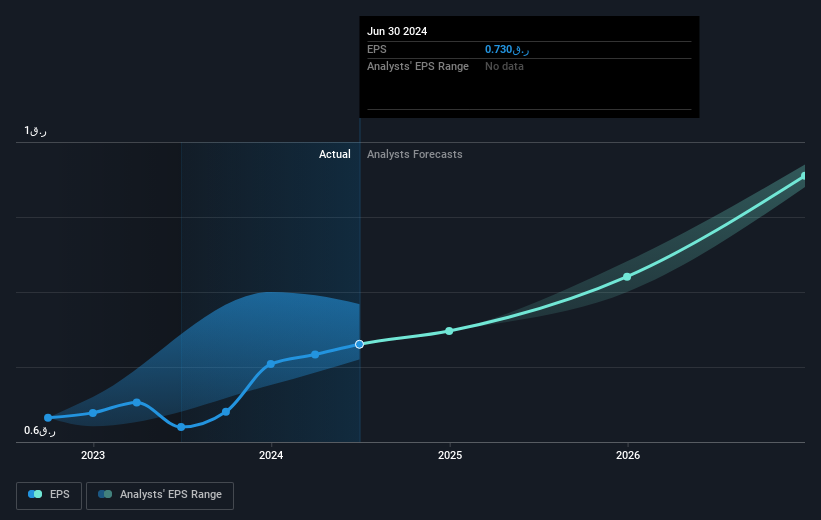Qatar International Islamic Bank (Q.P.S.C) (DSM:QIIK) jumps 3.5% this week, though earnings growth is still tracking behind five-year shareholder returns

Generally speaking the aim of active stock picking is to find companies that provide returns that are superior to the market average. Buying under-rated businesses is one path to excess returns. For example, long term Qatar International Islamic Bank (Q.P.S.C) (DSM:QIIK) shareholders have enjoyed a 43% share price rise over the last half decade, well in excess of the market return of around 0.08% (not including dividends). On the other hand, the more recent gains haven't been so impressive, with shareholders gaining just 16%, including dividends.
On the back of a solid 7-day performance, let's check what role the company's fundamentals have played in driving long term shareholder returns.
View our latest analysis for Qatar International Islamic Bank (Q.P.S.C)
To paraphrase Benjamin Graham: Over the short term the market is a voting machine, but over the long term it's a weighing machine. One imperfect but simple way to consider how the market perception of a company has shifted is to compare the change in the earnings per share (EPS) with the share price movement.
During five years of share price growth, Qatar International Islamic Bank (Q.P.S.C) achieved compound earnings per share (EPS) growth of 5.3% per year. This EPS growth is lower than the 7% average annual increase in the share price. So it's fair to assume the market has a higher opinion of the business than it did five years ago. That's not necessarily surprising considering the five-year track record of earnings growth.
The company's earnings per share (over time) is depicted in the image below (click to see the exact numbers).

We know that Qatar International Islamic Bank (Q.P.S.C) has improved its bottom line lately, but is it going to grow revenue? You could check out this free report showing analyst revenue forecasts.
What About Dividends?
It is important to consider the total shareholder return, as well as the share price return, for any given stock. The TSR incorporates the value of any spin-offs or discounted capital raisings, along with any dividends, based on the assumption that the dividends are reinvested. It's fair to say that the TSR gives a more complete picture for stocks that pay a dividend. As it happens, Qatar International Islamic Bank (Q.P.S.C)'s TSR for the last 5 years was 80%, which exceeds the share price return mentioned earlier. And there's no prize for guessing that the dividend payments largely explain the divergence!
A Different Perspective
It's good to see that Qatar International Islamic Bank (Q.P.S.C) has rewarded shareholders with a total shareholder return of 16% in the last twelve months. Of course, that includes the dividend. Since the one-year TSR is better than the five-year TSR (the latter coming in at 12% per year), it would seem that the stock's performance has improved in recent times. Someone with an optimistic perspective could view the recent improvement in TSR as indicating that the business itself is getting better with time. Importantly, we haven't analysed Qatar International Islamic Bank (Q.P.S.C)'s dividend history. This free visual report on its dividends is a must-read if you're thinking of buying.
Of course Qatar International Islamic Bank (Q.P.S.C) may not be the best stock to buy. So you may wish to see this free collection of growth stocks.
Please note, the market returns quoted in this article reflect the market weighted average returns of stocks that currently trade on Qatari exchanges.
Valuation is complex, but we're here to simplify it.
Discover if Qatar International Islamic Bank (Q.P.S.C) might be undervalued or overvalued with our detailed analysis, featuring fair value estimates, potential risks, dividends, insider trades, and its financial condition.
Access Free AnalysisHave feedback on this article? Concerned about the content? Get in touch with us directly. Alternatively, email editorial-team (at) simplywallst.com.
This article by Simply Wall St is general in nature. We provide commentary based on historical data and analyst forecasts only using an unbiased methodology and our articles are not intended to be financial advice. It does not constitute a recommendation to buy or sell any stock, and does not take account of your objectives, or your financial situation. We aim to bring you long-term focused analysis driven by fundamental data. Note that our analysis may not factor in the latest price-sensitive company announcements or qualitative material. Simply Wall St has no position in any stocks mentioned.
About DSM:QIIK
Qatar International Islamic Bank (Q.P.S.C)
Provides banking, financial, and investment solutions.
Proven track record with mediocre balance sheet.


